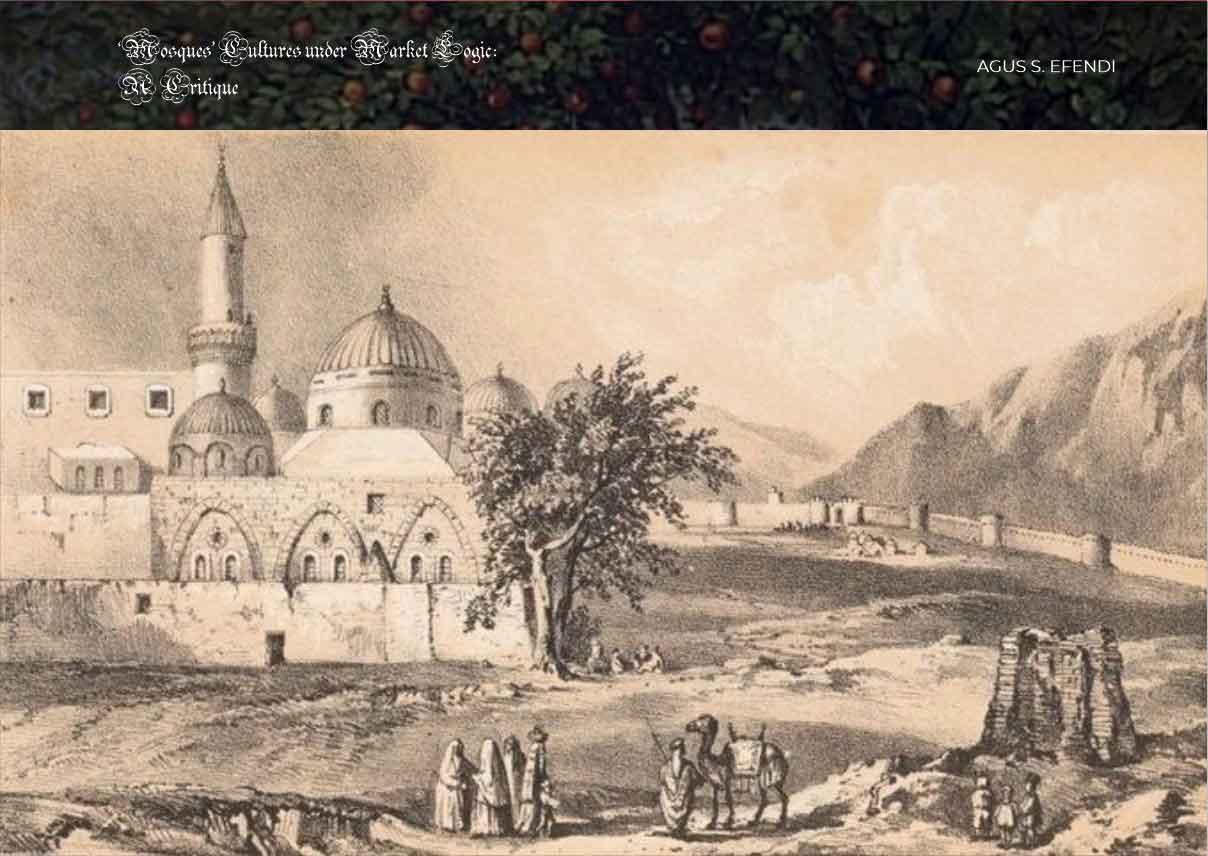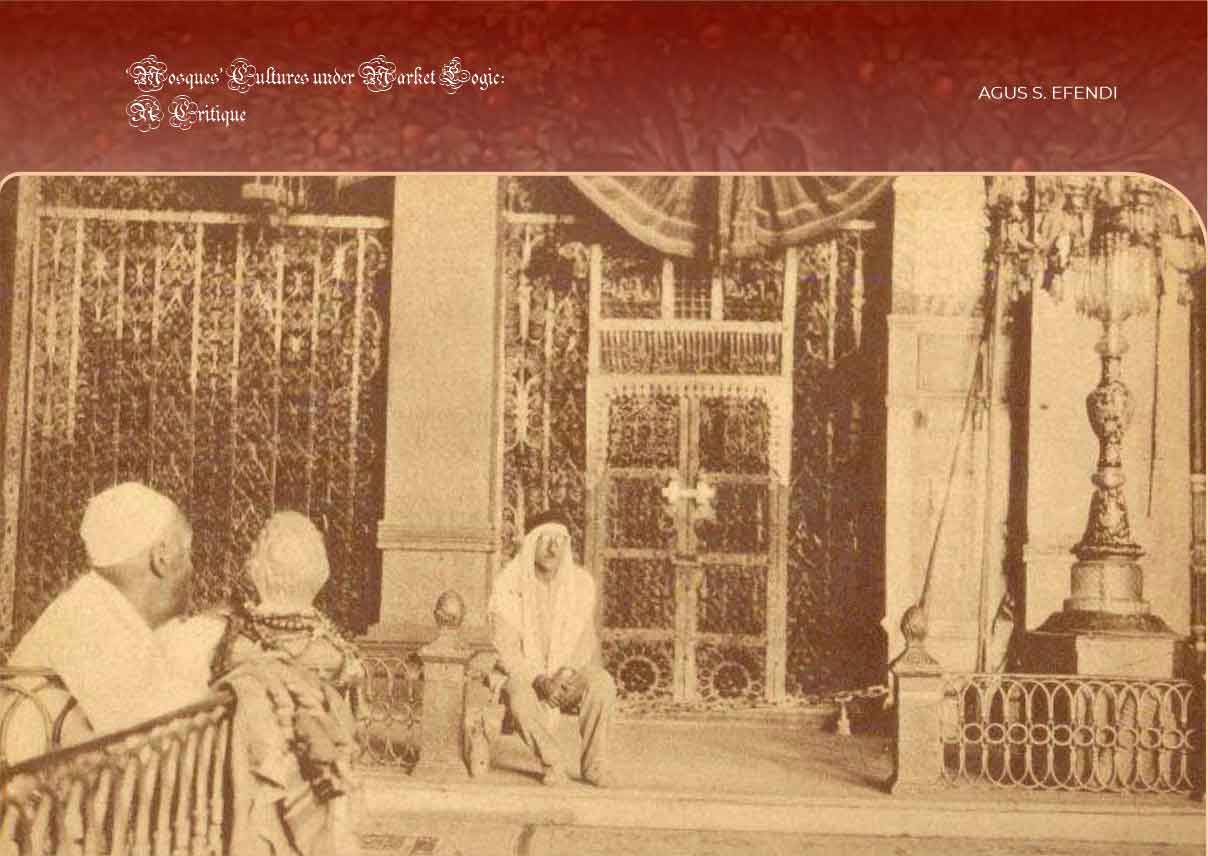
As the main site of religious practices, mosque is perceived to be the heart of cultivating Muslim community. At the beginning of Islam, precisely in the Madinah periods, this site has social functions for instance building solidarity, making social cohesion, and solving public problems.
These functions thus made mosques to be an institution that educates the community with egalitarian values and inclusive participation. From this point, we can understand that the da’wa of Islam is not mere spreading normative values but also how to handle a wide range of social problems. And more interestingly the mosque is frequently used to be the site of musyawara (public discussion). In there, the Muslim community and the broad range of social unit called umatan wahida—according to the Madinah treaty, this social unit is plural in character because comprise cross religions and cross ethnics bounds— establish public spheres.

But this formative structure of Islam changes to be more structural and stable to accommodate the complexity of Muslim communities. This is the political dimension of Islam. But could we accept that the daulah (means; political unit) is inseparable from Islam. Many historians tend to accept it and believe that Muslim’s political conquest is a bloody territorial occupation. I doubt such a claim because the main historical narrative of Muslim’s territorial conquest is to liberate human beings. There is no coercion to convert the other people being Islam. There is public policy that gives more incentives to Muslims. The establishment of daulah—beginning from Muawiyah period— as legitimate power to organize society thus driving the development of the educational institution.
In this period, the madrasa (systematic education disciplines) is the site of knowledge production and socialization. I suppose because of the limit of the state education budget, madrasa is initiated by the Muslim community itself. And this education activity takes place mostly in the mosques. Nevertheless, we all know that the most influential Muslim scholar—fuqoha and ahl hadits— in the formative period educate themselves in informal madrasa. We must point out that without political intervention these education activities tend to enlarge the inclusivity of public discourses within the Muslim community.
In the next periods, the canonization system of knowledge for the sake of maintaining the legitimacy of political power stopped innovation and critique. This tendency then drove public discourse to be a cul-de-sac. Therefore, we could understand why the field of knowledge production in Medieval Muslim society became conservative and normative. Unfortunately, I think most Muslim countries still maintain that model of education and insist to socialize it as legitimate knowledge.
The establishment of modern institutions that promote liberal values has both mental and material consequences to lift European society. In the first one, the production of knowledge became flourishing. This is also encouraging modern people to cultivate the learner ethos to make innovations or different ways of thought. But we must aware that the relationship between knowledge production and religion (The Christian Churches) is conflictual because the latter has the power to monopolize the truth claims.
This historical particularity then brings modern knowledge that seems to be sceptical about religion (as an institution) and recognizes it as far as being private. Above all, the European society evolutionary develop their inclusive public discourses. I think this is made the public sphere relatively dynamic in order to respond to a wide range of social problems. And the ultimate modern problem is how to archive prosperity. At the time, European peoples believe global merchants would thrive in their homeland. For this reason, they started to colonize the rest of the world. What makes the colonization successful is that European people have advanced knowledge from military technology, organizational efficiency and philosophical foundation to gain legitimate power.
The main effect of colonization within Muslim countries is the operation of market logic being dominant. Absolutely, this is influenced by many factors, but we can perceive it as the colonizer's implicit pedagogical predisposition that is to insist on the material gain over the mental (symbolic) occupation. Maybe it is also linked with the resiliency of traditional cultures that brought conservative inclination.
Read Also: Bazaar Market in Globalized-World
When I found myself living in contemporary Muslim countries, I always reflect what is the main reason my people were left behind. Why does the number of mosques flourish enormously as the site of religious prayer but at the same time educated Muslims cannot establish inclusive public discourse? I would answer that question with the cultural perspective; that is, we forgot the mosque culture which Muhammad launch in Madinah. The mosque is not merely the site of religious people's prayer, but it is also the site of community building, both from intellectual discursive to material dimensions. I also point out that the operation of market logic drove Muslims to compete within the field of religious piousness that manifest in the mosque booms. Therefore, we dismiss to develop our madrasa (education with creativity and critique) in order to achieve what we always call rahmatan lil ‘alamin.
https://www.pewartanusantara.com/mosques-cultures-under-market-logic-a-critique/?feed_id=19&_unique_id=63980a9a8eed1As the main site of religious practices, mosque is perceived to be the heart of cultivating Muslim community. At the beginning of Islam, precisely in the Madinah periods, this site has social functions for instance building solidarity, making social cohesion, and solving public problems.
These functions thus made mosques to be an institution that educates the community with egalitarian values and inclusive participation. From this point, we can understand that the da’wa of Islam is not mere spreading normative values but also how to handle a wide range of social problems. And more interestingly the mosque is frequently used to be the site of musyawara (public discussion). In there, the Muslim community and the broad range of social unit called umatan wahida—according to the Madinah treaty, this social unit is plural in character because comprise cross religions and cross ethnics bounds— establish public spheres.

But this formative structure of Islam changes to be more structural and stable to accommodate the complexity of Muslim communities. This is the political dimension of Islam. But could we accept that the daulah (means; political unit) is inseparable from Islam. Many historians tend to accept it and believe that Muslim’s political conquest is a bloody territorial occupation. I doubt such a claim because the main historical narrative of Muslim’s territorial conquest is to liberate human beings. There is no coercion to convert the other people being Islam. There is public policy that gives more incentives to Muslims. The establishment of daulah—beginning from Muawiyah period— as legitimate power to organize society thus driving the development of the educational institution.
In this period, the madrasa (systematic education disciplines) is the site of knowledge production and socialization. I suppose because of the limit of the state education budget, madrasa is initiated by the Muslim community itself. And this education activity takes place mostly in the mosques. Nevertheless, we all know that the most influential Muslim scholar—fuqoha and ahl hadits— in the formative period educate themselves in informal madrasa. We must point out that without political intervention these education activities tend to enlarge the inclusivity of public discourses within the Muslim community.
In the next periods, the canonization system of knowledge for the sake of maintaining the legitimacy of political power stopped innovation and critique. This tendency then drove public discourse to be a cul-de-sac. Therefore, we could understand why the field of knowledge production in Medieval Muslim society became conservative and normative. Unfortunately, I think most Muslim countries still maintain that model of education and insist to socialize it as legitimate knowledge.
The establishment of modern institutions that promote liberal values has both mental and material consequences to lift European society. In the first one, the production of knowledge became flourishing. This is also encouraging modern people to cultivate the learner ethos to make innovations or different ways of thought. But we must aware that the relationship between knowledge production and religion (The Christian Churches) is conflictual because the latter has the power to monopolize the truth claims.
This historical particularity then brings modern knowledge that seems to be sceptical about religion (as an institution) and recognizes it as far as being private. Above all, the European society evolutionary develop their inclusive public discourses. I think this is made the public sphere relatively dynamic in order to respond to a wide range of social problems. And the ultimate modern problem is how to archive prosperity. At the time, European peoples believe global merchants would thrive in their homeland. For this reason, they started to colonize the rest of the world. What makes the colonization successful is that European people have advanced knowledge from military technology, organizational efficiency and philosophical foundation to gain legitimate power.
The main effect of colonization within Muslim countries is the operation of market logic being dominant. Absolutely, this is influenced by many factors, but we can perceive it as the colonizer's implicit pedagogical predisposition that is to insist on the material gain over the mental (symbolic) occupation. Maybe it is also linked with the resiliency of traditional cultures that brought conservative inclination.
Read Also: Bazaar Market in Globalized-World
When I found myself living in contemporary Muslim countries, I always reflect what is the main reason my people were left behind. Why does the number of mosques flourish enormously as the site of religious prayer but at the same time educated Muslims cannot establish inclusive public discourse? I would answer that question with the cultural perspective; that is, we forgot the mosque culture which Muhammad launch in Madinah. The mosque is not merely the site of religious people's prayer, but it is also the site of community building, both from intellectual discursive to material dimensions. I also point out that the operation of market logic drove Muslims to compete within the field of religious piousness that manifest in the mosque booms. Therefore, we dismiss to develop our madrasa (education with creativity and critique) in order to achieve what we always call rahmatan lil ‘alamin.





